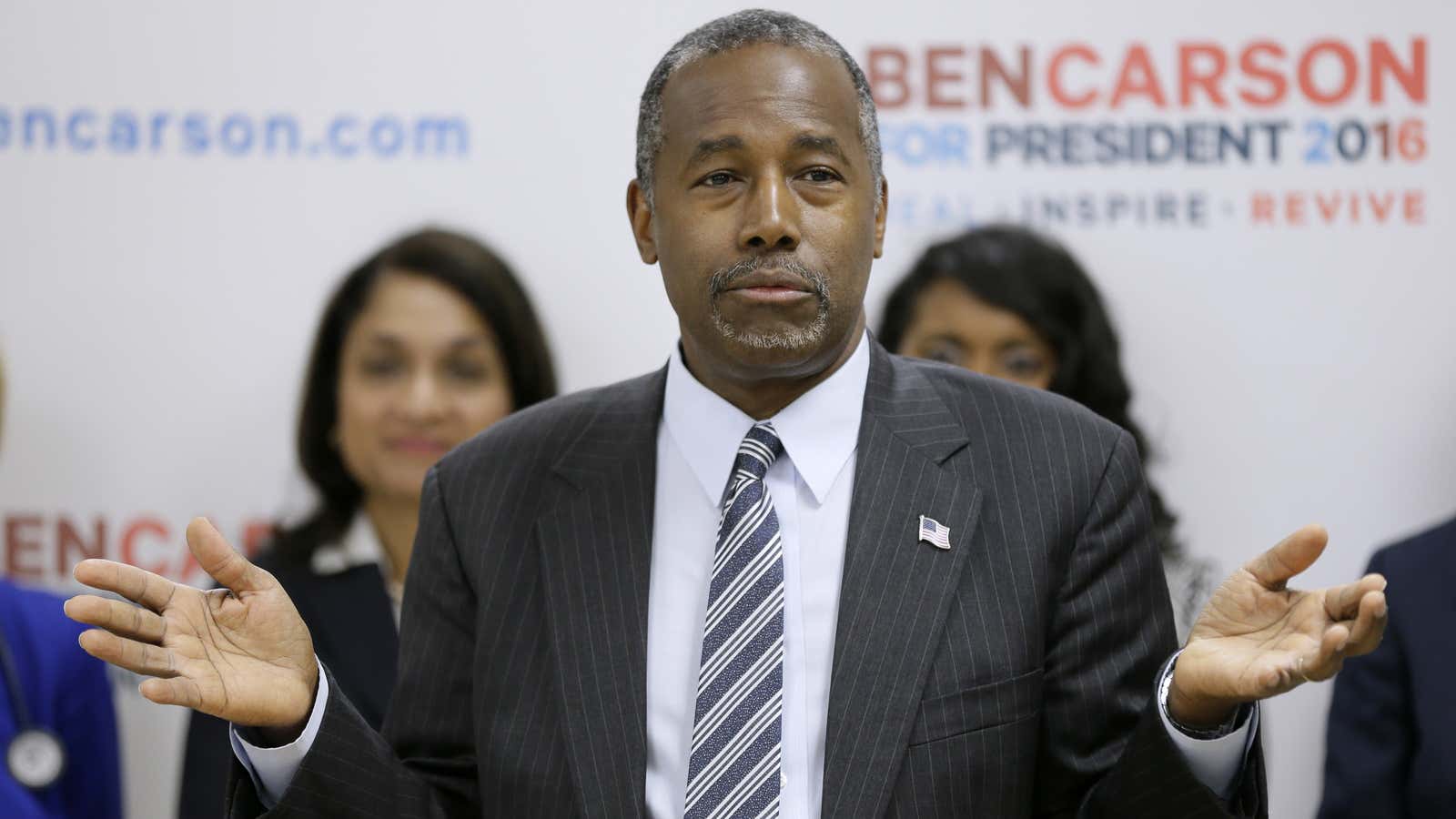Ben Carson, brain surgeon and presidential candidate, is repeating a controversial and historically inaccurate argument against gun control. In his alternative version of history the Holocaust could have been prevented if regular Germans, or German Jews, had been armed.
This is not just an off-the-cuff remark, a gaffe that Carson has recently been prone to–he wrote about his theory in a new book called “A More Perfect Union.” ”[T]hrough a combination of removing guns and disseminating propaganda, the Nazis were able to carry out their evil intentions with relatively little resistance,” Carson writes.
CNN’s Wolf Blitzer asked Carson to elaborate on his theory:”Just clarify, if there had been no gun control laws in Europe at that time, would six million Jews have been slaughtered?”
“I think the likelihood of Hitler being able to accomplish his goals would have been greatly diminished if the people had been armed,” Carson answered.
Blitzer, like any person with an even minimal knowledge of World War Two, pointed out that the Carson’s idea just may be a tad too simplistic: “Because they had a powerful military machine, as you know, the Nazis.”
“I’m telling you that there is a reason that these dictatorial people take the guns first,” said Carson.
There are a couple of problems with Carson’s argument, which has been used by gun rights advocates before. For one, as Salon pointed out in 2013, gun laws in Weimar Germany before Hitler came to power, were actually stricter. Right before the war erupted, Jews in Germany were indeed forbidden to have guns (and many other things, relegated by the Nazis to second-class citizens). But as the Anti-Defamation League emphasizes, the small number of firearms held in the hands of the few German Jews left in the country in 1938 would be a grossly inadequate match for the massive Nazi war operation. Hitler began his aggressive campaign of re-armament after he took power in Germany in 1933, exponentially increasing the size of the army and militarizing the country’s power structures. In 1938, there were barely over 200,000 German Jews left in the country. In 1939, the Wehrmacht counted 2.7 million soldiers.
Gun control laws had zero to do with the failed–but heroic–uprising in the Warsaw Ghetto in 1943. It was not Europe’s legal prohibitions that prevented a handful of young people from liberating the Ghetto from Nazi hands–it was a profound mismatch of manpower, the difficulties of smuggling weapons into the confines of the Ghetto, and a shortage of arms in Poland in general.
To follow Carson’s logic to its extreme when it comes to the US, however, is perhaps more troubling then indulging his dabbles in historical fiction. Since the end of the American Revolution, the US has been a nation governed by rule of law, not by tyrants or dictators. Presidents leave office after one term or two, not by the barrel of a gun or the hands of an angry mob. They sit next to their successor as he assumes power, on the steps of the Capitol building. The American system of government is imperfect. It has seen politics stretched to the limit by all manner of challenges in recent decades. But that peaceful transfer of power has yet to be interrupted.
More great American scandals and crises have been lost to historians than can be counted on two hands. Even ones that seemed, at the time, to pull at the fabric of our union. Teapot Dome. Credit-Mobilier. The Second Bank of the United States. The entire Grant administration. America survived them all. Indeed, the fiercest armed uprising by citizens against the government was about dividing the Union to preserve slavery, not about saving it.
America’s progress has never been linear. Human greed, avarice, and failure have always challenged its ideals. And yet the US system of government has not delivered tyranny (no matter what the secessionists in 1861 claimed). It has delivered a nation where speech is so free that candidates for its highest office can compare its trundling bureaucracy to the horrors of Nazi Germany, with zero fear of reprisal. The idea of an American president militarizing the government under a single party banner is about as likely as the time travel that would be required to test Carson’s theories on arming the Jewish people of Europe. Roosevelt couldn’t even get a few extra justices onto the Supreme Court.
What should frighten voters most about Carson isn’t his stance against gun control laws; it’s what he thinks Americans should be doing with their guns in the first place.




